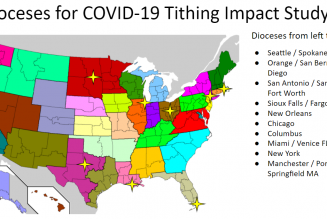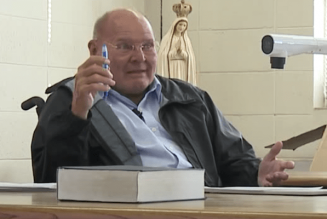
ROME – For most of human history, when someone was accused of a crime, whatever passed for a trial to assess guilt was a simple affair: Victim v. Defendant. Unsurprisingly, such “trials” often boiled down to who was more powerful, wealthier or better connected, and had only a passing relationship to justice.
In the late 17th century, Enlightenment philosopher John Locke argued that the progress of civilization required the state to supplant the victim as the accusing party in a criminal trial, in order to ensure neutrality and fairness.
“All private judgment of every particular member being excluded, the community comes to be umpire, by settled standing rules, indifferent, and the same to all parties,” Locke wrote. “There, and there only, is a civil society.”
To this day, as anyone who’s ever watched an episode of “Law and Order” knows, victims aren’t parties to criminal trials – it’s the D.A. who brings the charge and makes the calls in the name of the state.
Yet beginning in the late 1960s, partly in reaction to a series of rulings from the Warren court protecting the rights of defendants, a burgeoning Victims’ Rights movement has chipped away at the state’s monopoly. A series of state and federal laws have established requirements for victims to be informed about the development of their case, to be physically present in the courtroom, to be consulted by prosecutors, and to deliver victims’ impact statements during sentencing.
To be sure, those reforms have their critics. Skeptics often point to the 2018 sentencing of former Olympics gymnastic coach Larry Nassar, who had been convicted on seven counts of assault and one of child pornography, yet a total of 156 women delivered impact statements broadcast live over seven days. Afterwards, Nassar was sentenced to 175 years in prison.
“The question is whether the victims needed that, as bloodletting, and should the justice system allow that? Or is it a throwback to public hanging?” said Nancy Gertner, a former district-court judge from Massachusetts, in a 2018 New Yorker interview.
Nonetheless, the days in which victims had basically no role at all in criminal prosecutions are essentially over. All of which brings us to the Code of Canon Law, the Church’s own body of law, and the balance between the institution and the victim.
Like American law, victims of clerical sexual abuse are not parties to criminal procedures, and for the same reason described by Locke. In a briefing for reporters this week on Pope Francis’s recent decision to lift the obligation of pontifical secrecy in such cases, Spanish Bishop Juan Ignacio Arrieta, secretary of the Pontifical Council for Legislative Texts, said it’s because “the interests of the victim are assumed by the state.”
The problem, of course, is that by “state” Arrieta means “institutional church,” and to ask victims of clerical abuse to trust the institution to look after their interests is often a tough sell.
Over and over, one hears complaints from abuse survivors of being kept in the dark about what’s happening with their canonical complaints, of being refused access to files compiled as part of the process, and of having no say in whatever canonical sanction is imposed.
Recently, Crux spoke to Valeria Zarza, a former member of Argentina’s Hermanos Discípulos de Jesús de San Juan Bautista, an order which was suppressed by the Vatican in June after numerous allegations of sexual and psychological abuse arose against the founder, Father Agustin Rosa, and other prominent members.
RELATED: Argentine victim calls bishop’s apology for abuse a ‘mockery’
Zarza said that several victims of priests from the order have been waiting for more than a year for an update on their cases, but they’ve had no communication from the Church.
Arrieta said that the code does require victims to be informed about the outcome of their case, but he acknowledged the wait can be long and the silence deafening in the meantime. He also suggested that lifting pontifical secrecy may not change much for victims directly, because they’re still “not a party to the penal process and don’t have a legal right to the acts of the case.”
It’s worth noting that in all its official communications on the move, the Vatican stressed that it will facilitate better cooperation with police and civil prosecutors, but officials didn’t say much about what it might mean for the role or rights of victims in abuse cases.
What remains to be seen is whether a Victims’ Rights movement may have the same effect on the ecclesiastical justice system it’s had in the civil sphere.
One can imagine, for instance, victims pressing for a right of access to those acts, to being able to file briefs along the way responding to various points in the record, and to being heard directly before sentence is imposed.
In a recent interview with the Religion News Service, Dutch canon lawyer Myriam Wijlens, a member of the Vatican’s Pontifical Commission for the Protection of Minors, seemed to hint in this direction.
“I personally believe, as a canon lawyer, that we could strengthen in penal processes the participation of the victim. Which is rather weak at the moment,” Wijlens said.
Arrieta told reporters the role of victims in penal procedures “is being studied.” The next moment when we get a glimpse of the fruits of that study may come when the Vatican releases a long-awaited overhaul of book six of the Code of Canon Law, which deals with penal procedures and sanctions.
Arrieta said the project has been underway for a decade, and he expressed hope that it may be complete within the next six months.
The basic take-away in most quarters from the pope’s decision to end pontifical secrecy was that 1) it represents enormous progress, and 2) there’s still considerable work left to be done. In that second category, it will be fascinating to see if a Catholic version of the Victims’ Rights movement becomes the next frontier in reform.
Follow John Allen on Twitter: @JohnLAllenJr
Crux is dedicated to smart, wired and independent reporting on the Vatican and worldwide Catholic Church. That kind of reporting doesn’t come cheap, and we need your support. You can help Crux by giving a small amount monthly, or with a onetime gift. Please remember, Crux is a for-profit organization, so contributions are not tax-deductible.








